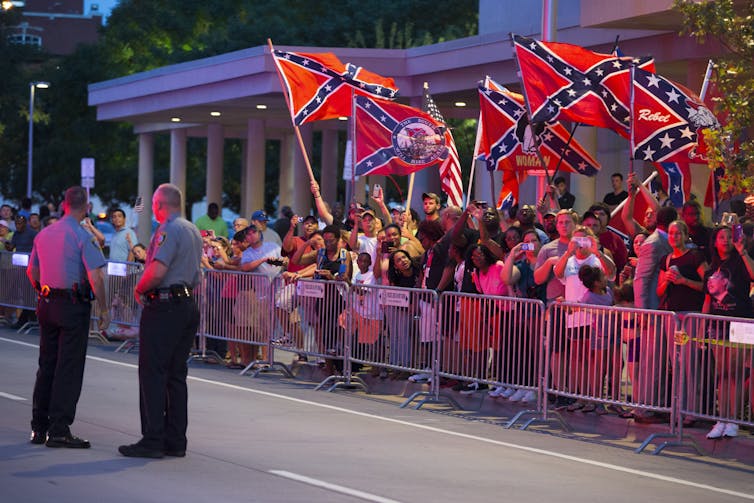
By Marjorie Hershey
I imagine that lots of people won’t like this article. They’ll feel attacked. They’ll feel it’s unfair. The depth of that response will show just how deeply rooted American politics is, and has always been, in racial fears.
The centrality of race to our politics is clear in the current presidential campaign. The most common campaign slogan is from the campaign of Donald Trump: “MAGA” – Make America Great Again. The slogan indicates that the U.S. was once great but has fallen from greatness.
So what caused America’s fall?
Former president Trump introduced MAGA as his campaign slogan when he began his presidential run in 2015. Central to his announcement, and repeated endlessly since then, is his claim that illegal immigrants assaulting our border are an existential threat because, he claims, they are rapists, criminals and other kinds of predators.
His anti-immigrant campaign is steeped in race. When criticizing what he calls the country’s “open borders,” he isn’t referring to Canada. In fact, he hopes, he says, for more immigrants from Norway and other predominantly white nations.
The fearsome immigrants, the “others,” are the ones who have darker skin than most white Americans; their racial identity is written on their faces. How do we distinguish these immigrants from other Americans who have darker skins? There’s no need; the former president has warned us about them as well. You know, the earlier immigrants, from countries he referred to as “s***hole countries.”
Social scientists like me have been able to demonstrate that concern about race has long been central to Trump’s appeal. As the U.S. begins another presidential campaign in which Trump is likely to be the GOP nominee, here’s what we have found:

AP Photo/Evan Vucci
Racial resentment key
Researchers showed that the second-strongest determinant of individuals’ vote for Trump in 2016 and 2020 – first, of course, was the voter’s party identification – wasn’t people’s economic fears or their commitment to individual freedom. It was respondents’ racial resentment, measured by agree-disagree questions such as, “Whites in the U.S. are more discriminated against than Blacks,” and “Blacks are getting advantages from elites that Blacks have not earned.”
Substantial numbers of Americans, including one-third of white respondents, claim that white Americans face either a “great deal” or a “fair amount” of discrimination in the U.S. Among Republicans, well over half claim that white people are discriminated against, a larger percentage than acknowledges discrimination against Blacks, Latinos or Asians.
White Americans’ racial resentment increased substantially during the Barack Obama presidency. Even many 2008 Obama voters soon found that the media focus on Obama becoming the nation’s first Black president, at first so exciting, was hard to swallow on a day-to-day basis.
The U.S. is not now “post racial,” free from racial prejudices or discrimination, nor has it ever been.
It’s not easy to argue seriously that white people are more discriminated against than Black Americans. Such a claim withers in the face of hard facts: that the average Black employee earns just 70% of the average white employee’s wages; that the median white household in 2021 had nine times as much wealth as the median Black household; that Black Americans, especially Black men, are jailed in much higher proportions than white Americans are; or that the homeownership gap between Black and white Americans is substantial, at 44% versus 73%, and growing.
Even reports from white Americans themselves belie the notion that they are more discriminated against than people of color. White people are less likely than other racial groups to report that they have experienced negative responses from other people. And among Black adults, “those with self-reported darker skin tones are more likely to report discrimination experiences than those with lighter skin tones” – added evidence that observed racial differences affect the way people are treated.

Brandon Bell/Getty Images
Anxiety deepens resentment
The centrality of race in American life is nothing new.
Race was the reason that a large portion of the U.S. – the South – could not have been legitimately defined as a democracy for most of the nation’s history. How could a region that deprived a large portion of its citizens of the right to vote systematically, in law and practice, on the grounds of their race be considered democratic?
But racial resentment seems to deepen in times of anxiety, when many people seek a specific target for their fears rather than deal with a vaguer sense of dread. The U.S. recently experienced an enormous source of anxiety: More than 1.1 million Americans died of a virus that affected virtually every aspect of day-to-day life, from our education and travel to the nation’s budget and public health.
The U.S. has also faced social-demographic change at a speed that those with racial resentment may find threatening. In just 20 years, from 2000 to 2020, the U.S. Census found that those who identified as non-Hispanic white dropped from about 75% of the population to 58%, though the two years’ measures are not completely comparable. These threats to the public’s health and to the image of the white American that so many traditionalists hold can encourage racial resentment.
However understandable it may be, it’s hard to argue that racial resentment, or any other hatred rooted in immutable differences, benefits U.S. society. Some segments of society do benefit from racial resentment, of course, and they will resist losing it as a campaign tool to protect their privileged status.
But if the U.S. is to fully realize the American ideals of freedom, opportunity and democracy for all, the country is going to have to face the reality of continuing discrimination against people of color and “others” of all types. Americans will need to not just talk about race but to listen, even if they don’t like what they hear.
As I said, lots of people won’t like this story.
![]()
Marjorie Hershey is Professor Emeritus of Political Scienceat Indiana University.





























Wallingford says
With Trump spewing his racist rants we will never be post anything. People like Trump spew their garbage about immigrants, especially Latino, and African-Americans to make them seem superior. It is a sociological fact that within 25 – 30 years Trump will be among the minority. White Europeans are not migrating to the US in the same rate as generations ago and the size of their families has lessened.
Trump can’t also help it since it is in his D NA. Daddy, Frederick Christ Trump, Sr. Was, reputedly, a member of the KKK and was arrested in 1929 at an anti-NYPD rally. Donald, shortly after assuming the helm of his Dad’s Business, was cited by the DOJ Civil Rights Division, a citation he agreed to, for rental discrimination.
Michael Cocchiola says
Racism is baked into American culture. Seventy-four million people voted for Trump in 2020 knowing full well they were voting for white supremacy. They knew because Trump spoke to them in their own politically incorrect language of suspicion, fear, intolerance, and hatred. Just what those tens of millions have been thinking and learning since they were born.
As long as there are distinctly uber-conservative southern and mid-American cultural bubbles where people avoid the frightening sin of progressive knowledge, there will be racism.